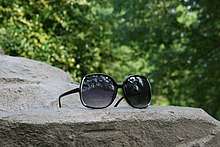Eye care
Many people have eyesight conditions which require corrective glasses, such as eyeglasses and contact lenses.
Understand
Optometric services can be difficult to obtain in remote places.
Corrective glasses
Travellers with daily need of corrective glasses could need to carry a spare pair. For sport and other activities, contact lenses might be more practical than wearing glasses.
Sunglasses

- See also: Sunburn and sun protection
Sunglasses are a classic among tourist accessories, especially to tropical, maritime and snow resorts, to prevent ultraviolet keratitis (snowblindness). Polarizing sunglasses filter reflections, which is especially useful on snow and at sea.
As sunglasses are easily lost or damaged, think twice before packing an expensive designer model. Regardless, check that the glasses really protect your eyes. If they are better at filtering visible light than at filtering UV radiation, they will increase the risk of keratitis rather than help.
Excessive wearing of sunglasses (indoors or in cloudy weather) could be regarded as bad manners, and a giveaway for being a careless tourist.
Eye care tourism
Eyeglasses can be cheaper in a foreign country, sufficient to pay for a journey. This also applies to surgery to treat myopia; see medical tourism.
Solar eclipse viewing
- See also: Solar eclipses
When going to watch a solar eclipse, you must wear special kinds of glasses because the brightness of the sun, when you look directly at it, can be bad for your eyes.